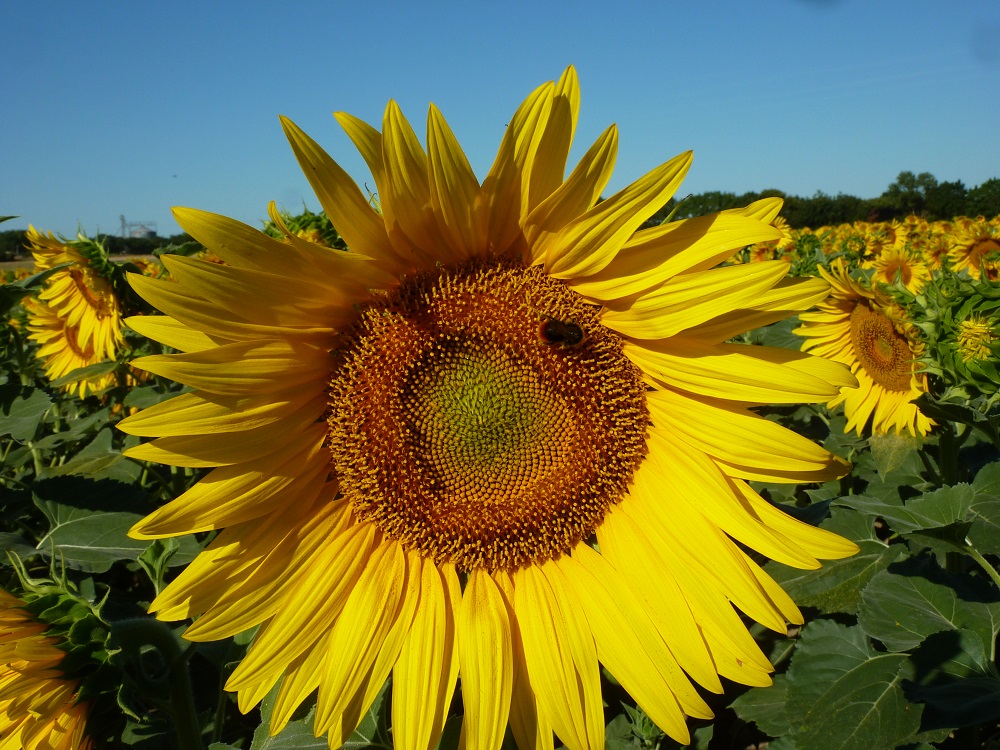An international scientific team, with the participation of the Doñana Biological Station, shows that maintaining grasslands adjacent to crop fields increases the abundance and diversity of wild pollinators, currently in decline.
This biodiversity-friendly system helps to obtain a higher crop production, but farmers may not profit economically. This raises a discussion about if the transition to biodiversity-friendly farming mandatory may provide economic yield or if it may require additional financial incentives.
An international team with members from the Doñana Biological Station – CSIC has demonstrated in a new study that maintaining grasslands adjacent to crop fields increases the abundance and diversity of pollinators, promoting their conservation. However, it also concludes that, although these grasslands benefit crop yield thanks to the services provided by these species, the cost-benefit analysis shows that this system is not economically profitable for farmers.
The study was conducted in Southwest France, in more than 20 sunflower crop fields, the most widely cultivated insect-pollinated crop in Europe. The team quantified the ecological, agronomic and economic benefits of biodiversity-friendly farming in an intensive crop system, consisting of maintaining grasslands adjacent to sunflower crop fields. "This is the first time that the entire process is evaluated, from landscape management, biodiversity in natural and agricultural areas to the effect on production and economic aspects", explains Ignasi Bartomeus, a scientific researcher of the CSIC at the Doñana Biological Station.
Results showed that reducing land-use intensity on agricultural grasslands drastically enhanced flower availability and wild bee diversity, including rare species. This is essential since agriculture not only drives loss of intrinsic values of biodiversity, but also causes declines in functional biodiversity that support agricultural production itself, such as wild pollinators, currently in decline. In addition, the study found that grasslands help to increase neighbouring sunflower crop yields, due to the positive effects of an increase of pollinators.
Nevertheless, when the team evaluated the economic profitability of this system, the results were not favorable. The economic benefits of enhanced pollination did not exceed the costs of reduced grassland forage yields. Ultimately, the conclusions of this research show that measures that promote pollinator conservation in agricultural landscapes are effective and increase productive yields, but they are not feasible if only economic profitability is considered.
The importance of biodiversity beyond economic factors
Biodiversity is not only a natural treasure to be conserved, but also it can provide ecosystem services to humans, such as crop pollination. However, this approach generates trends that may go against conservation. "This premise is promoting a mercantilist approach that encourages the conservation of biodiversity for its potential economic benefits", says Bartomeus. "However, with this study we see that it is possible to conserve biodiversity in agricultural areas and obtain higher production but it does not have to be profitable. We need to value conservation beyond economic terms".
This research was conducted as part of the European project Showcase, that aims to create synergies between agriculture and biodiversity to facilitate the agricultural sector's transition towards more sustainable farming. Currently, in this sense new research is taken place in the Guadalquivir River, in southern Spain. The results will be key to design European agricultural policies and will support the need to implement conservation incentives.
Reference:
Jeroen Scheper, Isabelle Badenhausser, Jochen Kantelhardt, Stefan Kirchweger, Ignasi Bartomeus, Vincent Bretagnolle, Yann Clough, Nicolas Gross, Ivo Raemakers, Montserrat Vilà, Carlos Zaragoza-Trello, David Kleijn. Biodiversity and pollination benefits trade off against profit in an intensive farming system. PNAS. https://doi.org/10.1073/pnas.2212124120
Contact:
outreach@ebd.csic.es
https://doi.org/10.1073/pnas.2212124120








 Open Call for Research Projects in ICTS-Doñana!
Open Call for Research Projects in ICTS-Doñana!


